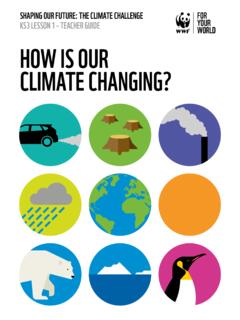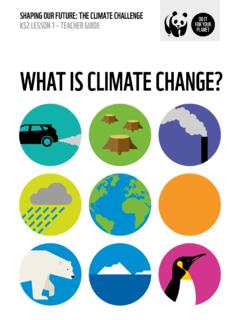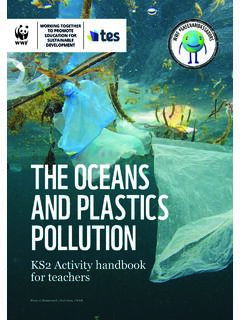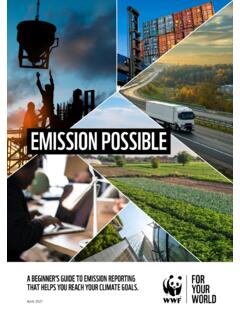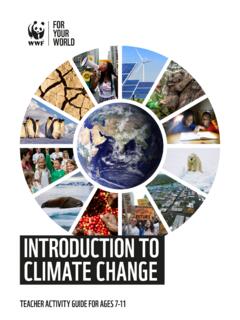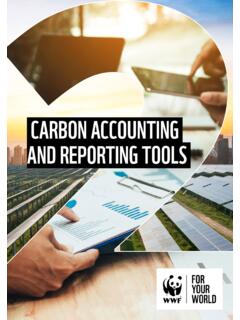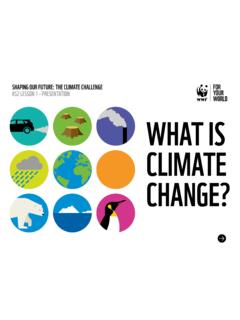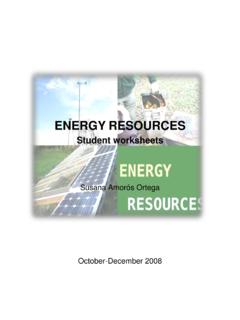Transcription of HOW IS OUR CLIMATE CHANGING? - WWF
1 SHAPING OUR FUTURE: THE CLIMATE CHALLENGE KS3 lesson 1 PRESENTATIONHOW IS OUR CLIMATE CHANGING? CLIMATE CHANGE IS HAPPENING RIGHT NOW!CLICK TO PLAYV ideo opens in YouTube1 What is the difference between the two?WEATHERWHAT IS CLIMATE CHANGE? is the day to day localised conditions, which have great variability (especially here in the UK).2 What is the difference between the two?WEATHERCLIMATEis the day to day localised conditions, which have great variability (especially here in the UK).is the long-term weather patterns for an IS CLIMATE CHANGE?
2 2 What is CLIMATE change?Throughout the history of the Earth, our CLIMATE has varied due to natural processes. However, in the last 150 years, our CLIMATE has begun to warm rapidly due to human IS CLIMATE CHANGE? 3 What is CLIMATE change?Throughout the history of the Earth, our CLIMATE has varied due to natural processes. However, in the last 150 years, our CLIMATE has begun to warm rapidly due to human is known as CLIMATE IS CLIMATE CHANGE? 3 What is CLIMATE change?Throughout the history of the Earth, our CLIMATE has varied due to natural processes.
3 However, in the last 150 years, our CLIMATE has begun to warm rapidly due to human is known as CLIMATE change. Currently, our CLIMATE is warming at a rate faster than ecosystems can IS CLIMATE CHANGE? 3 CLICK TO PLAYV ideo opens in YouTubeWHAT IS CLIMATE CHANGE? 4 FACTORS AFFECTING CLIMATEThe sun is the key driver for our climate5 FACTORS AFFECTING CLIMATEThe sun is the key driver for our climateWhen sunlight hits the Earth s atmosphere, the sun s radiation energy is partly: Absorbed by the atmosphere5 FACTORS AFFECTING CLIMATEThe sun is the key driver for our climateWhen sunlight hits the Earth s atmosphere, the sun s radiation energy is partly.
4 Absorbed by the atmosphere Reflected back to space by atmospheric particles, clouds and reflective parts of the Earth s surface ice and snow 5 FACTORS AFFECTING CLIMATEThe sun is the key driver for our climateWhen sunlight hits the Earth s atmosphere, the sun s radiation energy is partly: Absorbed by the atmosphere Reflected back to space by atmospheric particles, clouds and reflective parts of the Earth s surface ice and snow Absorbed at the Earth s surface5 FACTORS AFFECTING CLIMATEThe sun is the key driver for our climateWhen sunlight hits the Earth s atmosphere, the sun s radiation energy is partly.
5 Absorbed by the atmosphere Reflected back to space by atmospheric particles, clouds and reflective parts of the Earth s surface ice and snow Absorbed at the Earth s surfaceThe resulting transfer of this heat energy is responsible for changes in the Earth s AFFECTING CLIMATEL ocal CLIMATE varies due to the following influences: latitude6 FACTORS AFFECTING CLIMATEL ocal CLIMATE varies due to the following influences: latitude location, relative to continents and oceans6 FACTORS AFFECTING CLIMATEL ocal CLIMATE varies due to the following influences: latitude location, relative to continents and oceans situation in relation to large-scale atmospheric circulation patterns6 FACTORS AFFECTING CLIMATEL ocal CLIMATE varies due to the following influences.
6 Latitude location, relative to continents and oceans situation in relation to large-scale atmospheric circulation patterns altitude6 FACTORS AFFECTING CLIMATEL ocal CLIMATE varies due to the following influences: latitude location, relative to continents and oceans situation in relation to large-scale atmospheric circulation patterns altitude local geographical features6 FACTORS AFFECTING CLIMATEL ocal CLIMATE varies due to the following influences: latitude location, relative to continents and oceans situation in relation to large-scale atmospheric circulation patterns altitude local geographical featuresThese influences can either amplify or reduce the direct impact of CLIMATE change depending on where you live.
7 6 THE GREENHOUSE EFFECTM oregreenhouse gasesSUNS olar radiationLess heatescapes into spaceRe-radiatedheatMorere-emittedheatCO 2 CH4 N2 OAtmosphereGreenhouse gasesSUNS olar radiationMore heatescapes into spaceRe-radiatedheatLessre-emittedheatCO 2 CH4 N2 ONATURALGREENHOUSE EFFECT7 THE GREENHOUSE EFFECTM oregreenhouse gasesSUNS olar radiationLess heatescapes into spaceRe-radiatedheatMorere-emittedheatCO 2 CH4 N2 OAtmosphereGreenhouse gasesSUNS olar radiationMore heatescapes into spaceRe-radiatedheatLessre-emittedheatCO 2 CH4 N2 ONATURALGREENHOUSE EFFECTINCREASED global WARMINGCAUSED BY HUMAN ACTIVITY7 GREENHOUSES GASES AND THEIR ORIGINS Click a gas to explore further8 GREENHOUSES GASES AND THEIR ORIGINS Water vapour (H2O) Biggest contributor to the natural greenhouse effect and varies the most in the atmosphere.
8 ADAM OSWELL / WWF-GREATER MEKONG8 GREENHOUSES GASES AND THEIR ORIGINS Water vapour (H2O) Biggest contributor to the natural greenhouse effect and varies the most in the atmosphere. Human activities have little impact on the level of water vapour in the atmosphere. ADAM OSWELL / WWF-GREATER MEKONG8 GREENHOUSES GASES AND THEIR ORIGINS Methane (CH4) Naturally generated during decomposition of organic matter. It is also produced by animals and released by natural gas deposits. ADAM OSWELL / WWF-GREATER MEKONG8 GREENHOUSES GASES AND THEIR ORIGINS Methane (CH4) Naturally generated during decomposition of organic matter.
9 It is also produced by animals and released by natural gas deposits. Human activities like dairy and beef cattle farming, burning of fossil fuels and drilling for natural gas significantly add to the level of methane in the atmosphere. ADAM OSWELL / WWF-GREATER MEKONG8 GREENHOUSES GASES AND THEIR ORIGINS Nitrous oxide (NO2) Makes up a tiny percentage of the total greenhouse gas content of our atmosphere compared to CO2. global warming IMAGES / WWF8 GREENHOUSES GASES AND THEIR ORIGINS Nitrous oxide (NO2) Makes up a tiny percentage of the total greenhouse gas content of our atmosphere compared to CO2.
10 Mainly produced by human activities such as burning fossil fuels and wood, sewage treatment and the widespread use of nitrogen-based fertilisers. global warming IMAGES / WWF8 GREENHOUSES GASES AND THEIR ORIGINS Carbon dioxide (CO2) Probably the most important of the greenhouse gases as it accounts for the largest proportion of the trace gases (a trace gas is a gas which makes up less than 1% by volume of the Earth s atmosphere). global warming IMAGES / WWF8 GREENHOUSES GASES AND THEIR ORIGINS Carbon dioxide (CO2) Probably the most important of the greenhouse gases as it accounts for the largest proportion of the trace gases (a trace gas is a gas which makes up less than 1% by volume of the Earth s atmosphere).
